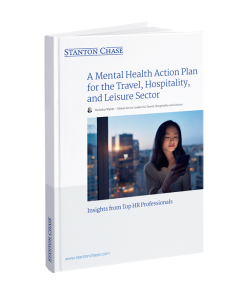
Nearly a quarter of hospitality workers are experiencing common mental health problems.
Research conducted by the University of Cambridge and University College London, which analysed data from 20,000 people, revealed that the two industries with the highest percentage of employees experiencing common mental health problems were real estate (23.6%) and hospitality (23.8%).
The travel, hospitality, and leisure sector is often perceived as dynamic and exciting, offering opportunities to meet new people and create memorable experiences. However, it also has a less glamorous side hidden beneath its sparkling facade. This industry is infamous for its high-pressure environment, which can significantly affect employees’ mental health. The long hours and the constant need to deliver exceptional service can lead to various mental health issues.
Recognising this, Stanton Chase decided to interview top HR leaders in travel, hospitality, and leisure companies. Our goal was to understand how they are addressing the issue of mental health in the workplace and what steps they are taking to improve the situation.
The HR leaders we interviewed come from a diverse range of companies, including major airlines, renowned global and regional hotel groups, and mainstream restaurants. We have respected their anonymity and that of their companies in the answers provided to the questions below, ensuring they could speak honestly and openly about their experiences.
1. What factors have contributed to the current emphasis on mental health in the workplace?
All of the surveyed HR leaders concurred: discussions around mental health in the travel, hospitality, and leisure sector have significantly increased since the end of the COVID-19 pandemic. Some of the contributing factors they shared with us during our interviews include:
- The transition from physical to cognitive labour in contemporary workplaces, and a societal shift towards individualism, have profoundly impacted mental health.
- The industry has seen a rapid ascension of younger professionals into senior roles, faster than in other sectors, leading to an influx of responsibilities. This, combined with the aftermath of the pandemic and the challenges related to recruitment and reintegration of employees, has contributed to a surge in mental health concerns.
- The pandemic has diminished the stigma associated with mental health, fostering more open dialogues. Individuals are now placing greater emphasis on self-care.
- The importance of maintaining mental health, through rest, balanced diet, regular exercise, and so on, is now being championed just as much as finding solutions for those facing mental health challenges.
However, one interviewee, a commercial airline, highlighted that mental health awareness has always been a crucial issue in their sector, given the need to ensure that personnel, such as pilots, are mentally fit before undertaking flights.
“I believe people have become more open about their mental health issues in recent years, perhaps due to the use of platforms like Microsoft Teams and Zoom. These platforms might make people feel more comfortable sharing their concerns, as they offer a sense of face-to-face interaction without the conventional pressure of an in-person meeting,” another HR leader added.
2. Is poor mental health a new pandemic?
When it came to this question, consensus was split. Some of the HR leaders we interviewed said that they believed poor mental health was the new pandemic—others said that poor mental health has always been an issue in the workplace since time immemorial, but that people finally feel comfortable talking about it.
Some of the other observations made by HR leaders we interviewed included:
- The fear generated during the pandemic has led to a secondary mental health crisis. The long-term impacts of lockdowns on mental health are yet to be fully understood, but they are expected to be significant and negative.
- Mental health is now as commonly discussed as physical health was 20 years ago.
- The greater emphasis on personal health and well-being, especially with the rise of social media and fitness culture, has brought mental health to the forefront.
- While the majority of companies maintain records on employee absenteeism, details, particularly those pertaining to mental health, frequently stay unreported. This lack of clarity makes it challenging for employers to distinguish between absences due to physical illness and those resulting from mental health issues, stress, or burnout.
“Is mental health the new pandemic? I think it’s always been one,” one HR leader said.

3. Who is responsible for employees’ mental health?
Acknowledging the importance of mental health in the workplace, HR professionals have been deliberating who should bear the responsibility for employees’ mental health. The consensus appears to be that the responsibility is shared, although the specifics can vary from one company to another.
The following is what we understood from our discussions with HR leaders:
- The majority of the HR leaders we interviewed stated that responsibility for mental health is a collective duty—shared by managers, leaders, and employees alike. While HR plays a pivotal role, everyone has a duty of care for their colleagues.
- Several HR leaders suggested that direct managers and line managers should shoulder more responsibility for the mental health of their subordinates.
- A minority of HR leaders felt that HR did not bear a large part of the responsibility in ensuring employees’ mental health.
- One HR leader shared that their company adopts a holistic approach to mental health, with everyone from servers to CEOs taking responsibility. Their organisation prioritises mental health training from the onset and strives to maintain an ongoing conversation about mental health.
“I believe we hold a significant responsibility towards our employees. We, as HR leaders, can offer support to those who might not even realise they need it,” one HR leader said.
4. What is the scope of your company’s wellness program?
The scope of a company’s wellness program can vary dramatically based on the unique needs and culture of each organisation.
Here’s how the HR professionals we interviewed described their company’s wellness programs:
- Most companies provide Employee Assistance Programs (EAPs) and anonymous employee surveys to gauge engagement levels and perceptions about the company culture and management. One company mentioned they offer independent professional assistance for all facets of well-being and financial support through EAPs.
- Several companies revealed that they partner with mental health program providers to deliver support tailored to their specific contexts.
- A supportive culture that fosters open dialogue is a pivotal element of many companies’ wellness programs, and regular non-performance-related discussions are encouraged.
- Wellness Action Plans are deployed in certain organisations as a proactive approach to mental health issues. These plans equip managers with guidance on handling mental health matters.
- One company noted that, for multinational corporations, wellness programs need to be customised to the exact region in which they’re being launched, as cultural variances can significantly influence the effectiveness of mental health support.
- One company revamped their employee assistance portal into an “app” for easier access and integrated it into their wellness programs. This overhaul is intended to offer pre-emptive support and immediate assistance during crises
“I dedicate half of my time to ensuring we have an effective Employee Assistance Program. We have training programs in place, designated ambassadors, and we provide support through various charities,” one HR leader said.

5. Is there a certain type of employee who is more comfortable speaking openly about mental health in the workplace?
The HR leaders we interviewed provided varying insights into whether certain demographics of employees were more likely to experience or discuss mental health challenges at work. Their insights included:
- A minority of HR leaders claimed there were no differences among demographics, irrespective of race, age, or gender. They believed that all employees seemed equally likely to speak openly about mental health challenges at work.
- The majority of HR leaders noted that younger employees seemed to be leading the conversation on mental health. Conversely, “older” employees, specifically those from Gen X and the Baby Boomer generation, were often more resistant to discussing mental health at work.
- One HR leader observed that men appeared to find it more challenging to discuss their mental health difficulties compared to women.
- Another HR leader noted that their back-of-house teams, particularly chefs, seldom raised concerns or discussed mental health. The HR leader additionally theorised that it could be because back-of-house staff tend to be more introverted than front-of-house staff.
- The culture of certain industries, where resilience is valued and seeking mental health support is perceived as a weakness, presents a significant obstacle to open dialogue about mental health in the workplace. For instance, in aviation, pilots risk being grounded if they acknowledge mental health issues, which discourages open discussions.
“Sadly, we’ve experienced three or four mental health incidents in the past year, primarily among young and middle-aged men. As a result, we’re directing our ambassadors, training, and support more towards this demographic,” shared one HR leader.
6. What leads to poor mental health in the workplace in the travel, hospitality, and leisure industry?
We asked the HR leaders we interviewed about the factors they believed were contributing to poor mental health in their industry. Their responses were diverse, but some common themes emerged.
The insights we gathered included:
- The majority of HR leaders identified long working hours, personal or financial issues, low pay, unpredictable shifts and schedules, a lack of hours for shift workers, short-staffing, and strained relationships both at home and at work as the primary stressors negatively impacting the mental health of employees in the travel, hospitality, and leisure industry.
- One HR leader observed that working under a disliked boss seemed to contribute more to poor mental health than the work itself.
- Another HR leader acknowledged that their employees encountered stressors such as flight delays or air union strikes, but that they had adapted to such issues and it didn’t significantly contribute to poor mental health.
- Some HR leaders believed that poor mental health is an inherent condition rather than a consequence of the working environment.
“The cost-of-living crisis is so severe that some of our employees’ only warm meal of the day might be the one we provide. And because people are working more overtime to try to earn more money to make ends meet, they have less time for social life and family, which also has a negative mental health impact,” one HR leader shared.

7. Are customers kinder to service staff in the travel, hospitality, and leisure industry post-pandemic?
The pandemic has significantly altered many aspects of life. As the world “reopened” post-COVID, a prevailing question was whether customer relationships would have changed due to the prolonged period of isolation everyone had experienced.
We asked the HR leaders we interviewed if their teams had reported changes in customer interactions after the pandemic. Here’s what they shared:
- One HR leader noted that their customer ratings improved since COVID-19. This suggests that customers are having positive interactions with their teams. However, this might be due to the removal of the numerous challenges the hospitality industry faced during the pandemic, leading to happier customers.
- Contrastingly, another HR leader reported a sharp increase in aggressive and disruptive passengers in the commercial aviation industry.
One plausible explanation for these varied experiences could be that customers are interacting differently with different subsectors within the tourism, hospitality, and leisure industry. While customer interactions may be improving in some types of businesses post-COVID, others may not be experiencing the same effects.
“For some reason, there are far more incidents on flights of customers being unreasonably difficult or disruptive than there were pre-pandemic,” one HR leader shared.
8. Is it necessary to make changes to ensure employees take breaks and time off?
By now, it is widely understood that long hours, overtime, burnout, and stress contribute to poor mental health. Therefore, the question facing travel, hospitality, and leisure companies is whether they should implement policies ensuring their employees take sufficient time off in the form of annual leave and daily breaks to combat poor mental health.
Here are the insights we gathered from the HR leaders we interviewed:
- None of the HR leaders we interviewed advocated for mandatory time off to ensure leave and breaks were being utilised. The minority of HR leaders expressed that managers should encourage their employees to take time off and refrain from working on their days off.
- The majority of HR leaders stated that most of their employees worked shifts and therefore controlled when they worked, thus not requiring intervention. Many HR leaders also mentioned being short-staffed, which prevented them from advocating for time off policies due to fear of worker shortages.
- One HR leader noted that often, financial pressures deter people from fully utilising their leave. For instance, part-time workers might book a few days off but then choose to work the rest of the week to increase their earnings. This HR leader’s company offered an extra paid day off for special occasions like the Jubilee and the Coronation, but surprisingly, only 35% of employees took advantage of it
“I caution against well-meaning interference. It can be more harmful than beneficial and could increase an employee’s stress levels instead of reducing them. I advocate for limited policies, procedures, and guidelines, implementing only as many as necessary, and providing a comfortable environment for those who need exceptions to these rules,” one HR leader stated.
9. Is it HR’s responsibility to recognise problems with mental health, and are they adequately prepared and qualified to do so?
The issue of mental health in the workplace is here to stay, whether the HR department is ready for it or not. This leads us to the next logical question: can HR leaders recognise mental health problems in the workplace, and is it their role to do so?
The HR leaders we interviewed shared the following insights:
- The majority of HR leaders stated that they are making an effort to identify mental health problems in the workplace. However, the majority of HR leaders also acknowledged their lack of qualification to do so.
- One HR leader expressed that they believed it was neither their responsibility to spot mental health problems in the workplace, nor were they qualified to do so.
- Another HR leader believed that HR should be vigilant about mental health problems in the workplace, but they did not see mental healthcare as a defined responsibility or expectation for HR.
- Contrarily, two HR leaders asserted that they do believe it’s HR’s role to recognise mental health problems, and they felt adequately prepared and qualified to do so.
“Most of our HR team is qualified in mental health first aid, and while they do not necessarily need this certification, they are adept at identifying problems reported by restaurant or support centre colleagues,” one HR leader shared.
10. Is HR equipped with the right resources to provide employees with mental health support?
Having established that the HR leaders we interviewed were attempting to combat mental health problems in the workplace—even if they didn’t believe it was their job or that they were qualified to do so (with a few exceptions)—the next logical question is whether they are equipped with the necessary resources to provide employees with mental health support.
The HR leaders we interviewed provided these insights:
- The majority of HR leaders felt they could benefit from additional tools to address the challenge of poor mental health in the workplace.
- Only one HR leader interviewed felt they had all the resources they needed to face the challenge of mental health in the workplace head-on. However, they admitted that even with a full toolbox, they could only assist “up to a point.”
“When mental health discussions arise, HR is told to do more—but we have limited resources, a limited budget, and aren’t given a seat at the table when it comes to high-level discussions,” one HR leader shared.

11. How do HR professionals set boundaries to protect their own mental health?
Working with poor mental health on a daily basis can be a challenge in itself. HR leaders are often recognised for their empathy, but this trait can sometimes lead to them taking on too much of others’ burdens—potentially creating mental health problems for themselves if they fail to set strict boundaries with the people they try to help.
We asked the HR leaders we interviewed how they were protecting their own mental health. Here’s what they shared:
- One HR leader said that their department isn’t heavily involved in mental health matters, so setting boundaries wasn’t a problem for them.
- The majority of HR leaders expressed that HR professionals need to adopt a “put your own oxygen mask on first” approach to mental health to effectively help the employees they work with. One HR leader explained that this meant HR leaders needed to ensure their own mental health was in a good state before attempting to assist others.
- An HR leader revealed that in their company, HR department members are “buddied up” with people from other departments, like business development and operations, in an effort to cultivate friendships. They believe workplace camaraderie can help HR leaders safeguard their own mental health.
- Another HR leader highlighted that burnout is another issue HR leaders are grappling with, in addition to setting boundaries with the people they’re assisting. This could suggest that HR leaders are not only confronting challenging mental health issues, but they’re also potentially overworked and under-supported.
- One HR leader stressed that HR professionals need to learn how to delegate work and say “no” in order to set firm boundaries and protect their own mental health.
“If HR professionals themselves aren’t comfortable addressing their own mental health issues, it indicates a lack of a well-being culture,” one HR leader shared.
The Best Way to Improve the Mental Health in Your Travel, Hospitality, and Leisure Business
A study featured in the International Journal of Hospitality Management revealed several characteristics typically found in ineffective hospitality leaders:
- Displaying unprofessional behaviour
- Exhibiting an autocratic management approach
- Possessing insufficient leadership skills
- Lacking ethical integrity
- Having limited operational and technical competencie
- Demonstrating poor decision-making and delegation abilities
The same study also identified conditions that facilitate the rise of such flawed leaders:
- Corporate cultures and structures that accept or even endorse their shortcomings
- Companies that appoint leaders with inherent personal traits that are incompatible with effective leadership
- Organisations that place unqualified individuals in leadership roles
- Leaders who let their leadership proficiency degrade due to complacency or overconfidence
In the travel, hospitality, and leisure industry, poor leadership can intensify mental health issues among employees. That’s why it’s crucial to invest in the best possible leadership talent.
Companies must also continue to devise comprehensive strategies supporting mental wellbeing. Such strategies should not only include mental health programs but also address root causes like excessive work hours, low pay, and interpersonal conflicts.
Tackling these fundamental issues is no easy task—it demands stellar leadership. Luckily, you don’t have to face this challenge alone. At Stanton Chase, we offer more than 30 years of experience in developing and improving C-suites and boards.
If your leadership is grappling with issues it can’t seem to solve, we’re here to help. Click here to connect with one of our leadership consultants.
Click here to check out our earlier white paper, filled with mental health insights from top HR leaders in the life sciences and healthcare sector.
About the Author
Nicholas Wylde is a Managing Partner at Stanton Chase London and serves as the Global Sector Leader for Travel, Hospitality, and Leisure. He has been an executive search professional since 1989 and a Partner at Stanton Chase London since 1994.
Nicholas has successfully handled numerous senior leadership position searches for a diverse range of clients, including global corporations, UK-centric firms, start-ups, and private equity portfolio companies in the consumer and services sector. Typically, the positions he fills encompass roles such as Chief Executive Officers (both quoted and private), Regional Presidents, Chief Marketing Officers (CMOs), Chief Commercial Officers, Chief Customer Officers, Global CRM roles, Chief Human Resources Officers (CHROs), and board positions.
Nicholas has also previously served as the Chair of the Marketing Committee and Global Practice Leader for Consumer Products and Services at Stanton Chase.
Prior to his career in executive search, Nicholas enjoyed a career in hotel management, which included owning and operating a 16th-century coaching inn. He holds diplomas from Cornell University and the American Hotel and Motel Association in Hotel Administration.
How Can We Help?
At Stanton Chase, we're more than just an executive search and leadership consulting firm. We're your partner in leadership.
Our approach is different. We believe in customized, personal, and fearless executive search, executive assessment, board services, succession planning, and leadership onboarding support.
We believe in your potential to achieve greatness and we'll do everything we can to help you get there.
View All Services
